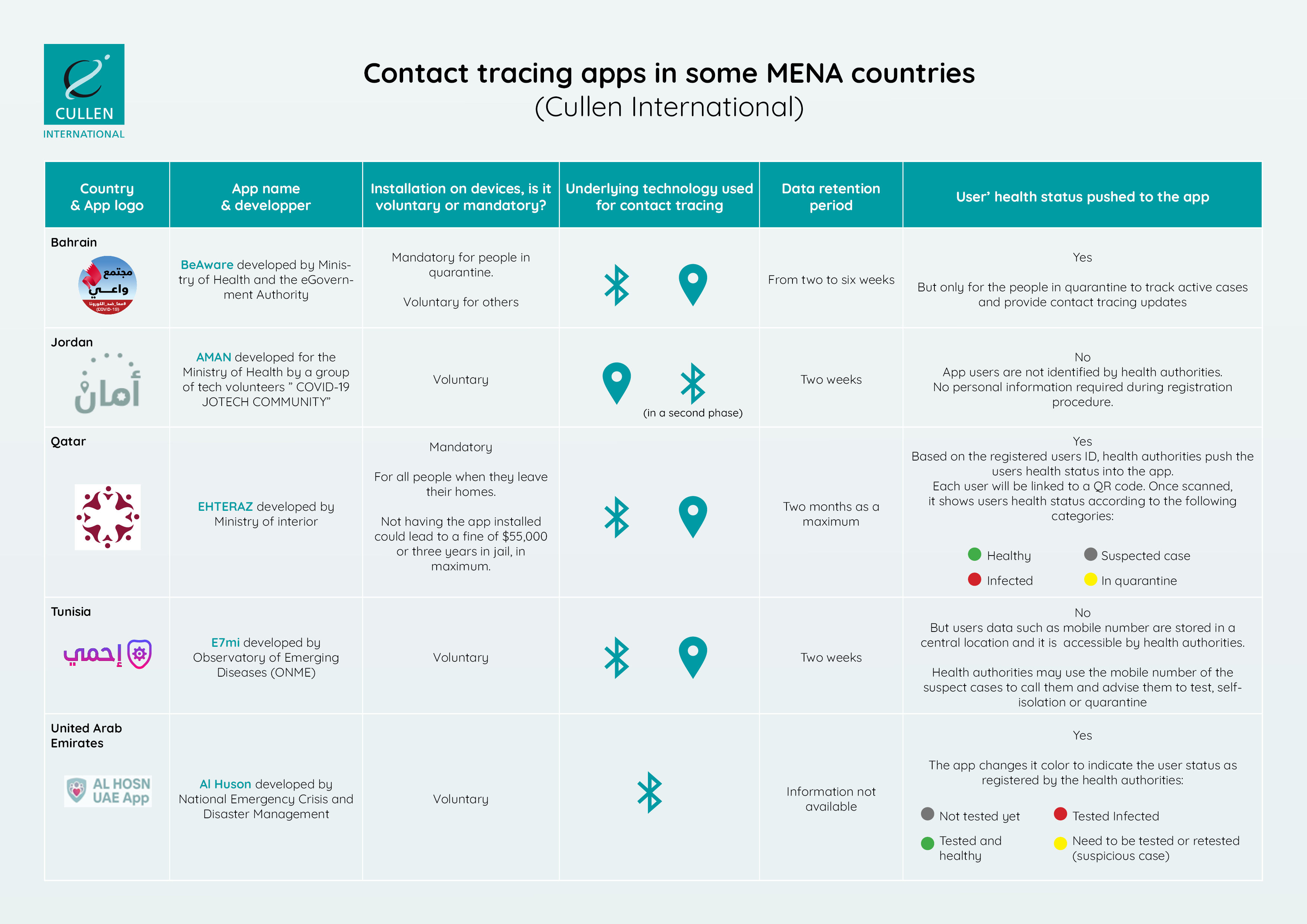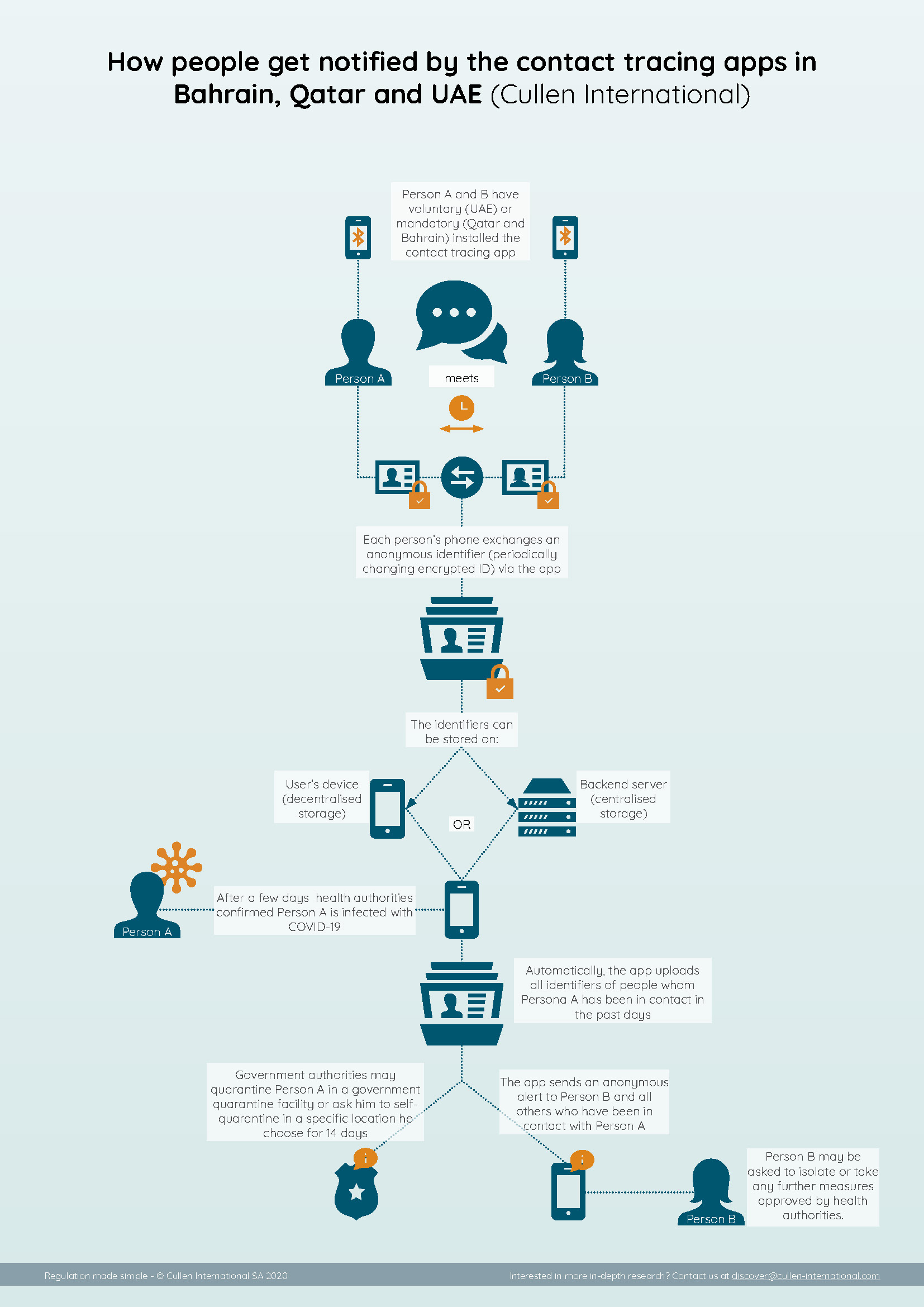Industry Thought Leadership
COVID-19: Contact Tracing Mobile Apps and Data Sharing Practices in MENA
May, 2020Many countries in the Middle East and North Africa (MENA) adopted technological solutions to halt the spread of COVID-19. Five MENA countries (Bahrain, Jordan, Qatar, Tunisia and UAE) have developed contact tracing apps to alert people who have been in recent contact with those who have tested positive for coronavirus.
During the pandemic, many telecoms operators around the world have announced that they are sharing specific information with government authorities. This includes the sharing of anonymised location data to enforce quarantine and to limit movement between specific areas. However, no such measures have been announced by a country in the MENA region.
Instead, many government authorities in MENA asked individuals to provide the data voluntarily, by installing mobile apps and to consent to sharing their location and contact information. Individuals were requested to volunteer to install COVID-19 related mobile apps in all the studied MENA countries, except in Bahrain and Qatar where installing the contact tracing app is mandatory in specific cases.
Data sharing by telecoms operators
None of the researched MENA countries officially required telecoms operators to share data with the government as a specific measure to mitigate the spread of COVID-19.
In those countries that have a personal data protection law in place, data sharing can be required in certain circumstances either for the public interest (this is the case in Qatar and Tunisia) or to prevent a pandemic (Algeria and Bahrain).
In Jordan, Egypt, Oman and Saudi Arabia, telecoms operators have specific obligations to protect the personal data of their subscribers, which prevent sharing except in certain cases.
In the UAE, the consumer protection regulations of the Telecommunications Regulatory Authority allow providers to disclose subscriber data if the disclosure is made in response to a lawful request from any competent authority in relation to matters involving the public interest.

Apps developed by governments to fight COVID-19
Five MENA countries have developed contact tracing apps:
- The apps in three of the five countries use Bluetooth technology with GPS. In the UAE, only Bluetooth is used, while Jordan currently uses only GPS, with Bluetooth planned to be added at a later stage.
- In Bahrain, Qatar and UAE, users' health status is stored and managed centrally, and pushed onto users' devices automatically.
- In Jordan, the user's data is stored on the user's device, with no personal information being required during registration. In Tunisia, the user's data is stored in a central server and is accessible by health authorities.
- Jordan, Tunisia and UAE have made the use of the app voluntary for everyone. In Bahrain, the app is mandatory only for people in quarantine, while in Qatar the app is mandatory when anyone leaves their home.

How Bluetooth contact tracing apps work
Contact tracing apps exchange anonymous unique identifiers using Bluetooth technology to collect information when users' devices come into proximity with other devices for a given duration, along with the geolocation information if the app also collects such data.
If the user confirms that he is infected with the virus, the app sends an alert to all other app users who have been in contact with that user. The app may also provide relevant information from health authorities on the steps to be taken, such as advising the user to get tested or to self-isolate, and which authorities to contact.
GPS information can additionally be used to perform specific functions, such as quarantine enforcement, mapping peoples' movement and concentration, and providing early warning to users to avoid infected areas.
Cullen International’s infographic shows how people get notified by the contact tracing apps in Bahrain, Qatar and UAE.

For more information and access to the full research, please contact [email protected].

